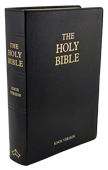The Holy Bible – Knox Translation
The Second Book of Kings
|
Chapter 11
|
1
And now spring returned, the time when kings march out to battle; and David sent Joab, with other servants of his and the whole army of Israel, to lay waste the Ammonite country and besiege Rabba, while he himself remained at Jerusalem.
2
One day, he had risen from his mid-day rest, and was walking on the roof of his palace, when he saw a woman come up to bathe on the roof of a house opposite, a woman of rare beauty.
3
So the king sent to enquire who she was, and was told that it was Bethsabee, Eliam’s daughter, wife to Urias the Hethite.
4
Thereupon he sent messengers to bring her to him; she came, and he mated with her, and as soon as she was cleansed from her defilement, back she went to her home.
5
Then, finding she had conceived, she sent the news of her conception to David.
6
Therewith came a message to Joab, summoning Urias the Hethite to David’s presence. So Joab sent him;
7
and David, when Urias reached him, asked whether all was well with Joab and the army, and how the fighting went;
8
then he bade him go back home and wash the dust from his feet. So Urias left the palace, and the king sent food after him from the royal table;
9
but Urias slept the night at the palace gate among his master’s attendants; go home he would not.
10
Then David, learning from common talk that Urias had not gone home, said to him, Thou art newly come from a journey; why wouldst thou not go back to thy house?
11
What, answered Urias, here are the ark of God and all Israel and all Juda encamped in tents, here are my lord Joab and all those other servants of my master sleeping on the hard ground; should I go home, and eat, and drink, and bed with my wife? The Lord save thee and keep thee, never that!
12
David bade him stay one day more; he would let him go on the morrow. That day and the next Urias spent in Jerusalem,
13
and ever he must eat and drink in the king’s presence, till he was bemused with wine; but still, when he went out at night, he made his bed beside his master’s attendants, and never returned to his home.
14
Next morning, David wrote a letter to Joab, which he despatched by Urias himself;
15
and this was its purport, You are to find a place for Urias in the first line, where the fighting is bitterest; there leave him unaided, to die by the enemy’s hands.
16
So, when he next made an assault upon the city, Joab gave Urias the post where he knew the defenders were strongest;
17
and some of these made a sally against Joab’s men, killing Urias and other of David’s men besides.
18
Then Joab sent David a full account of the battle;
19
and this was his word to the messenger who carried it: When thou hast finished giving the king the report of the battle,
20
it may be he will shew indignation. Why did you go so close to the wall, he will ask, when you were attacking it? You must have known that weapons fall thick under the battlements.
21
How fell Abimelech, that was son to Jerobaal? Was it not a piece of mill-stone, thrown by a woman, that killed him, there at Thebes? Why did you go so close to the wall?✻ Then let this be thy answer, Thy servant Urias the Hethite is among the dead.
22
So the messenger left him, and when he came into David’s presence he gave him all Joab’s message.
23
The enemy were too strong for us, he told David; they sallied out to fight us in the open, so we went to the attack, and chased them back to the very gate of the city.
24
But here the archers were shooting at us from the wall above, and many of the king’s men fell; thy servant Urias the Hethite is among the dead.
25
Upon this, David sent him back with a message for Joab: Never be daunted by what has befallen; still uncertain are the chances of war; now one, now another, the sword claims for its prey. Hurl thy men ever more strongly against the city, and destroy it; bid them keep their courage high.
26
When Urias’ wife heard that he was dead, she mourned for him;
27
her mourning over, David sent and fetched her to his palace, wedded her and had a son by her. But meanwhile David’s act had earned the Lord’s displeasure.


